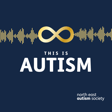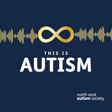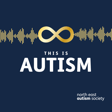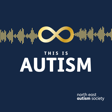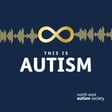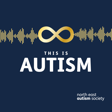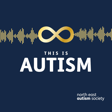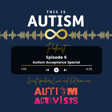Lauren Osborne's Dream Job in Creativity
00:00:06
Speaker
I'm living my dream job. I always wanted to do something creative. I'm management, I'm marketing, I'm admin.
Introduction to 'This Is Autism' Podcast
00:00:17
Speaker
Hello and welcome to This Is Autism, the podcast from the Northeast Autism Society.
00:00:21
Speaker
My name is Kerry Highcock and I'm the Family Development Manager at the charity.
Employment Barriers for Autistic Individuals
00:00:26
Speaker
Employment is a big issue for the neurodivergent community. Only three in 10 autistic people are in employment and one size fits all hiring practice.
00:00:34
Speaker
Lack of support at work can be a barrier to many people. But there is another way. Being self-employed can mean more flexibility and organizing your work to fit around you.
Lauren's Journey to Self-Employment as Illustrator and Author
00:00:44
Speaker
I'm delighted today to welcome Lauren Osborne, an illustrator and author who has been self-employed since she graduated in 2022.
00:00:53
Speaker
Lauren already has three books under her belt, including one she wrote herself, It's Okay to Be Me, which is based on her experiences as a young girl before her autism diagnosis at the age of 10.
00:01:04
Speaker
So we're going to be talking about Lauren's work, her inspiration, and the joys and challenges of being your own boss. So hi Lauren. Hello. It's lovely to have you here. Can you just jump straight in and tell us a little bit about yourself please?
Lauren's Educational and Personal Background
00:01:19
Speaker
Yeah of course. So um a little bit about me. I'm 25 years old. I'm from South Shields. I've lived here my entire life um and I was diagnosed as being autistic when I was 10 years old.
00:01:33
Speaker
um I went to University of Sunderland and I graduated with my bachelor's degree and my master's degree in illustration. um i am an author and illustrator.
00:01:45
Speaker
I have illustrated six children's books now um and I have written and illustrated my very own as well, which is It's Okay to Be Me. And I'm currently working on books seven and eight.
00:01:59
Speaker
Wow, that's brilliant. So we had it down as three, but you've actually done many more. I've done a few more, yes, since I last spoke to you guys. it's um It's been full of busy, as usual.
00:02:10
Speaker
ah So your latest book, Lauren, It's all Okay to Be Me, which I have seen. I've got a copy. It's incredible.
The Motivation Behind 'It's Okay to Be Me'
00:02:17
Speaker
Can you tell us a little bit about what was the aim of this book and where did the inspiration come from?
00:02:22
Speaker
So for me, when I first got my diagnosis at 10, and bear in mind, this is only 15 years ago, so not that long ago in the grand scheme of things, there wasn't anything out there that I can remember that I could look at and go, it's all right for me to be me myself.
00:02:42
Speaker
Um, when i was kind of like growing up, there wasn't a lot of media. There wasn't a lot of books. um both my parents who bear in mind were NHS, um, nurses, um they had no clue what autism was or what that meant for me and my future. Um, so they, they were completely left in the dark.
00:03:05
Speaker
So when I got my diagnosis, it was very much a case of here's the piece of paper. Um, off you go. um So there was no tools really for them or for me kind of come to terms with what this diagnosis meant for me myself.
Need for Authentic Autistic Representation
00:03:21
Speaker
um And something that I realized when I was in university was there still isn't a whole lot of media out there written not only for autistic people, but by autistic people as well. And that to me is the key.
00:03:37
Speaker
Why should autistic voices not be represented properly? You know, it's all fair and well writing something for autistic people. But if you yourself aren't autistic, there's only so much that you can bring to that ah to the table. So the real reason I wanted to write it was so that my experiences and story was out there. um But also so I could try and help other people who are going through ah similar things that I had already gone through.
00:04:12
Speaker
And what has the response been, and Lauren, from the group? What have people, you know, have people got back in touch with you and and told you how it's helped them? Yeah, honestly, the response to the book has been incredible. I didn't think it would have as big an impact as it has, but it really has.
00:04:29
Speaker
um And I'm absolutely blown away by that. um I've had a few parents get back in touch with us. There was this one man who got in touch with us and actually sent a ah ah video of a little girl reading the book and just...
00:04:48
Speaker
expressing how thankful she was that this is out there and that her daughter has something that she can relate to and that she absolutely loves. And honestly, that kind of like that really just choked us up in that moment because it was like, oh, my God, I've made such a difference. And I didn't even realize that I was doing that for for this young girl.
00:05:11
Speaker
So, you know, yeah, the the feedback has been absolutely incredible. I'm absolutely blown away by
Inspirations and Misconceptions about Autism in Creativity
00:05:18
Speaker
it. That's brilliant. and And obviously, I know one of your main roles is as an illustrator and, you know, your illustrations are wonderful and so very creative and and so detailed. where does and Where does your inspiration come from, Lauren, from for a lot of your work that you do?
00:05:34
Speaker
So a lot of my work you'll find is kind of based on um stories that already exist. So um one of the things that I did for university was for me final project and me bachelor's, I had to take some stories that already existed um And kind of do my own take on what those illustrations should look like.
00:05:58
Speaker
So the two stories I chose were Little Red Riding Hood and Alice in Wonderland. And I loved how spooky and dark I could make Alice Wonderland, how spooky and dark I could make Little Red Riding Hood.
00:06:13
Speaker
But I could also make Alice in Wonderland really creative and just kind of like full of wonder and stuff because that's entirely the point of the story.
00:06:24
Speaker
um But a lot of my inspirations come from classic fairy tales, um stories that already exist, stories people grew up with. Yeah. And I think as well, Lauren, you really challenged that, you know, the big misconception that we have that autistic people are not creative, which is clearly inaccurate in every in every way, isn't it? I think neurodivergent people actually...
00:06:47
Speaker
some often more creative than non-autistic people. would Would you kind of agree with that? Yeah, I think, you know, autistic people, many of us, so many of us have wild, vivid imaginations.
00:07:01
Speaker
You know, i've I've always kind of struggled when people say autistic people lack imagination because of any anything, now I've got too much of it. You know, if I didn't have imagination, I wouldn't be doing the job that I'm doing.
00:07:15
Speaker
um You know, I think that that mindset just comes and is perpetuated by so many um stereotypes that we see in the media.
00:07:25
Speaker
um You know, not only lacking creative imagination, but also social imagination is such a big um stereotype that many people who are autistic,
00:07:39
Speaker
um don't always experience. um And, you know, I think it's, um I think it's quite sad that people still ah have this very backwards view on the autistic experience because we're not robots.
00:07:54
Speaker
You know, we, yeah we see things and do things a little bit differently, but, you know, as far as ah imagination goes, yeah, we definitely have it.
Challenges of Previous Job Roles and Transition to Self-Employment
00:08:05
Speaker
Absolutely. Million percent. Million percent. and So what job roles you had in the past, Lauren, before you became self-employed? So ah one of the job roles I had was a support and development mentor.
00:08:18
Speaker
um And i absolutely loved that. I really enjoyed working with the different people that I did. um But for me, it was getting to a point where my mental health was um just being negatively affected.
00:08:33
Speaker
um And I made the decision for myself that I just need to bite the bullet um and go full time self-employed. Because at that point, I essentially had two jobs.
00:08:46
Speaker
um You know, I was not only um doing a job for someone else, but I was also working for myself. So I was having to meet deadlines on work.
00:08:57
Speaker
two separate jobs. um It meant that I was extra stressed out because again, I'm having to meet separate deadlines for separate projects. And it was very, very overwhelming. um And it got to the point where I actually experienced um autistic burnout, which anyone who's experienced that will know how dangerous and just how awful ah that is.
00:09:23
Speaker
I was exhausted. ah didn't have the energy to a to go out and do anything. I was so, so emotional um at that point as well. It was in December.
00:09:34
Speaker
um And I just couldn't bring myself to to do stuff that I normally would. um So it really just affected me mental health definitely at the very end.
00:09:47
Speaker
um You know, I'm glad that I've had that experience of being able to work for someone else. um You know, for the longest time when I was younger, i was terrified of going out into the, into the world and finding myself a job.
00:10:04
Speaker
um I was always ah bit apprehensive about how I would do that, what that would look like, um where I would work. You know, um the worst idea in my mind would be, you know, going against some sort of realta retail job because, you know, every day is just so, so different and chaotic. I think at 16, I would not have been able to cope with it. Yeah.
00:10:32
Speaker
So i'm I'm grateful for the experience that I've been able to have from it. um But it's definitely made me learn from that as well. um You know, some of the things that I don't want to put up with um and some of the things that I found um in the long run just weren't working for me.
00:10:54
Speaker
So would you say, Lauren, that one of the main reasons, I mean, one of the reasons is because you're incredibly talented, but was one of the main reasons for becoming self-employed and because of the negative effects on your mental health from having a, you know, working for somebody else?
00:11:09
Speaker
Yeah, absolutely. You know, it wasn't all doom and gloom. Like I say, I absolutely loved the job. I really enjoyed working myself. with station colleagues and being with the members they were great honestly you know when they got something right and they did it themselves it was almost like being a proud parent you were just like yes I am so happy you've managed to do this this is amazing look how far you've come but In the long run, it was just too much. I had too much on my plate.
00:11:44
Speaker
You know, again, it was two jobs. I had a job where it was basically a nine to five. I would get up, I would go to work four days of the week. And then the other three days of the week, I had me illustration jobs because, you know, sometimes at this other job, I wouldn't get home until six, seven o'clock at night.
00:12:06
Speaker
um And, you know, that's from starting at like half nine, 10 o'clock some days. So by the time I get home, I've had me dinner. There's not very much time for me to, one, have time for myself, but to do my illustration work. So it was a massive detriment to me.
00:12:24
Speaker
And I guess the slightly different topic, but it does link in around masking. Obviously, did you feel you had to mask more in your face? the job with people, the job that you wait where you weren't self-employed, whereas maybe when you self-employed, you could be more authentically you, perhaps?
00:12:41
Speaker
Did you see a...? Yeah, definitely. um ah think the masking came from the fact that my job role was to support others with additional needs.
00:12:53
Speaker
um Which was great because obviously I'm autistic myself. I know what that's like. But when you're a member of staff, it was more of a, I can't show how I'm actually feeling.
00:13:08
Speaker
because then that's going to have a negative impact on these guys. So a lot of that had, did mean that I had to mask quite a lot. Um, and I think the masking ultimately is what led to the burnout, um, because I was having to pretend, and wear that mask on almost a daily basis.
00:13:32
Speaker
Um, And again, as much as I love the job, it was definitely getting to the point where the mask was slipping. um You know, I ended up having a few panic attacks and stuff like that.
00:13:46
Speaker
um And obviously that was something where I would have to like hide that as well. Because if the group saw us having a panic attack,
00:13:57
Speaker
they're going to be panicking. What's wrong with Lauren? Why is Lauren doing that? Oh my God, what's happening to Lauren? So, you know, it was another thing where I would have to hide that. um So yeah, it was just, it was a really difficult time.
00:14:11
Speaker
Absolutely. I think what we'll do, Lauren, is we'll take a break there. And then after the break, we're going to have a little bit of a chat around the joys of being self-employed as an autistic person and what your plans are for the future. Yeah.
00:14:26
Speaker
Hi, while we're on a quick break, I thought I'd tell you a little bit more about the Family Development Service here at the Northeast Autism Society. The Family Development Services provides support for families pre, during and after diagnosis and includes a variety of services, including our parent and toddler groups, autism hubs, workshops for families, a dedicated enquiry line and our resource site as well, which can be found at at the Family Resource site on the Northeast Autism Society website.
00:14:52
Speaker
So if you go to www.ne-as.org.uk and go along to the Family Development site, you can find all the information there. Welcome back to This Is Autism. We're discussing self-employment as an autistic person with the lovely Lauren Osborne.
00:15:10
Speaker
So Lauren, can you just tell us what is it? What are the joys of being self-employed as an autistic person?
Benefits and Challenges of Self-Employment
00:15:18
Speaker
So the joys for me is being able to have my own schedule and being able to work when I see fit.
00:15:27
Speaker
You know, The joys of being an illustrator is the fact that I can just sit down and I can just draw. I don't need to consult with anybody. I don't need to ah work out with management when would be an appropriate time to do this, that and to other, because I am management. I am the admin. I am marketing.
00:15:49
Speaker
I am the accountant. um You know, I have... everything going on um which means I'm able to kind of like set my days on what tasks I'll be doing and when so something that I've started doing is making a to-do list um I'm a very visual person obviously but I find that if I have a to-do list um it's much easier for me to see what it is that I need to do in my day won
00:16:19
Speaker
to get everything done in time. um So what I'll normally do, i normally start at like half past nine in the morning and um when I'm at home in my studio. um And I'd just like to spend a good 15 minutes having a look at all the different tasks that I need to do in a day. So it could be um upload stories and stuff to Instagram and Facebook to let people know that I am still here and I'm still active.
00:16:47
Speaker
um Showing people what I'm getting up to in the day, um you know, little snippets of me illustrations and stuff like that. um But also it gives us an idea of how long each thing's going to take.
00:17:01
Speaker
So if I put down, send emails to blah, blah, blah, ah I know that for me, that's probably going to take five, 10 minutes depending on how many emails there are.
00:17:12
Speaker
So that's something that I can do straight away and I can take it off my list and I don't need to think about it for the rest of the day. um So it's great that I'm able to just have me little lists of things to do so that I can get them done um and not have to think about it after that.
00:17:32
Speaker
um I love being able to do that. um One of the other things i like as well is i can take a holiday whenever I please. You know, I know people are like, oh, you need to, you need to work and you need to be doing this. You need to be doing that. And it's like, yeah, that's great.
00:17:48
Speaker
But Taking time for yourself as well is so, so, so important, especially when you're self-employed. Because as I said before, I'm management, I'm marketing, I'm admin, I'm social media, I'm the illustrator, I'm the author in some cases.
00:18:07
Speaker
So if I'm not taking ah a good amount of time for myself to just relax, recharge, think about my next move, um then I'm not going to get anything done ah because I'm going to be too overwhelmed with everything that's kind of going on around me.
00:18:29
Speaker
But I absolutely love the fact that I can just wake up in the morning pull on my comfy clothes, go make myself a coffee and come and sit at my desk and do all my illustrations because my office is literally next door to my bedroom.
00:18:46
Speaker
So it is a dream. Easiest commute ever. That's amazing. And is there something, Lauren, about, you know, that kind of monotropic thinking as well, being able to get really, you know, deep into something about people bothering you?
00:19:00
Speaker
Do you find that a benefit? Yeah. I find that a massive benefit. You know, hyper focus is one of the reasons why I'm able to get so much detail into my illustrations, because once I've sat down, um I've put my headphones in and I'm just, I'm away.
00:19:17
Speaker
You're not, you're not getting me to move for any anything after that. um You know, it's um yeah, I love the fact that I can just sit down for hours on end and just kind of like disassociate from the world, because for me, that means I can get so much done in that time.
00:19:36
Speaker
um And, you know, some people might think that as a um as a negative thing, being able to just. you know disassociate from everyone and ignore all other things but for me I think that's great because I'm able to get so much done because of that um so absolutely I love being able to do that it's uh it's meant it's great so does being self-employed as an autistic person come with any challenges then Lauren Yeah, it um absolutely does. You know, some days it's just very much a case of I can't be bothered with this. You know, like most people, um regardless of whether you're self-employed or not, um I think we all have those days where it's I really can't be bothered.
00:20:24
Speaker
Or, you know, you wake up on Monday and you think, oh, this again. You know, it's um it's one of those things where... I think everyone experiences a little bit of, I don't want to be bothering with work today.
00:20:41
Speaker
But for me being self-employed, um ah don't necessarily always have that benefit of not being able to go into work because if I'm not going into work, I'm not making a living because, you know, there's no such thing as sick days for me. There's no such thing as paid holidays for me.
00:21:01
Speaker
um If I'm not working, I'm not earning, which is the ah the reality of it, you know. um I think one of the other things that I kind of struggle with sometimes, um again, it's a masking thing.
00:21:17
Speaker
um I do loads of markets and I do loads of in-person events as well. um So a lot of the time I will have to put on a mask, not because I'm intentionally trying to to mask my autistic self, but in some such situations it just feels unavoidable.
00:21:37
Speaker
um You know, if I'm doing a market, for example, you know, I'm selling my work. I'm trying to push my my work out there. I'm trying to get people to know who I am.
00:21:47
Speaker
So that requires me talking to everybody, anyone who will listen to me. i will be talking to them. But that leaves me so, so peopled out at the end of the day is the best way I can describe it.
00:22:02
Speaker
um And it's not really an overwhelming kind of feeling. It's more of an exhaustion, like a ah like an emotional fatigue. um So, yeah, there's definitely so umm um some negative things that can come from it.
00:22:17
Speaker
But I wouldn't trade those negatives for anything because I'm... living my dream job, essentially. You know, when I was um a kid, I always wanted to do something creative.
00:22:32
Speaker
I had friends who were like, oh, I want to be a nurse or i want to I want to join the police when I'm older or I want to go into the army. And for me, it was always, I want to draw.
00:22:43
Speaker
I want to do something creative. I want to, you know, ah went through stages of, oh, I want to be a fashion designer. And then it was, oh, I want to be an art teacher.
00:22:55
Speaker
um But it was always something around art. So the fact that I'm able to be a children's book illustrator is just an absolute dream come true.
00:23:05
Speaker
Absolutely. and in terms of employers and employment for autistic and neurodivergent people, what do you think employers should do better, Lauren, when it comes to supporting neurodivergent folk?
00:23:20
Speaker
I think when it comes to people who are employing neurodivergent people and specifically autistic people, um ah think people need to start listening to the actual autistic people instead of assuming what it is that we need or assuming it is that we want and allowing us to express for ourselves what we think would be best for that situation.
00:23:49
Speaker
You know, many people don't seem to understand that um many autistic people struggle with processing time so for me especially you know um I could be having a conversation with you um and you could have said something and I'll just immediately agree to it because it's kind of like word vomit it comes out before I realize what it is that I've said and it's not until later on that i've walked away from that conversation and I've gone home I've thought about it and I've gone hang on, I've agreed to something that I had no idea what they were talking about. Why did I do that?
00:24:24
Speaker
So, you know, I think employers need to understand that we're not being difficult. We're not trying to, um you know, upset them or anything. I mean...
00:24:36
Speaker
Quite the contrary. i am I'm a massive people pleaser. So my first go-to word is, yeah, yeah, of course. But, you know, I think they need to kind of take a step back and realize that in that situation, there's a good chance that we're masking.
00:24:50
Speaker
And there's a good chance that we are just saying yes to things to make it easier for them, not necessarily for us. um You know, so many people claim to know so much about autism. Yeah.
00:25:04
Speaker
but seem to get things backwards at the same time. And I think that's just... I don't know whether it's a mix of ignorance, and not ignorance in a bad way, ignorance of they just simply do not know and they haven't been educated on it, because that's what ignorance is.
00:25:26
Speaker
Or whether it is them just kind of, you know... going out of their way to make people uncomfortable. I doubt it's the second one. I think a lot of it comes down to ah lack of education on what autism actually is and how autism presents itself in each individual.
00:25:46
Speaker
um If you know anything about autism, one of the phrases you've probably heard is, if you've met one autistic person, you've met one autistic person. You know, we are not one in the same. um And I think so many people, especially employers, don't realize that.
00:26:05
Speaker
You know, I've been compared to... um Oh, and like this is an example. Oh, well, myia my son's autistic and you're nothing like him. Well, yeah, but your son's a six-year-old little boy.
00:26:19
Speaker
you know, I'm a 25-year-old woman, of course. I'm nothing like him. um You know, we're at two completely different stages in our lives. um How he is now might not be how he is in 20 years' time.
00:26:34
Speaker
You know, there's some people just seem to... compare autistic people to each other. And I don't think that's the way to go about it. I think if employers want to hire a truly diverse team of people who are neurodiverse, they need to start listening to those voices.
Critique of Puzzle Piece Symbol Usage
00:26:55
Speaker
One thing I still see, and it drives us up the wall, is so many companies using the puzzle piece symbol for Autism Acceptance Month. And it's obviously just a case of virtue signaling because if they actually knew anything about autism, they would know that the majority of autistic people hate the puzzle piece.
00:27:17
Speaker
We hate her You know, I had a tattoo of a puzzle piece years ago when I first was trying to understand what it was and then I realized what it actually meant. And I was so ashamed and because it was on my body now.
00:27:32
Speaker
So I went out on my way to get it lasered off and get a new tattoo over it because there was no way I was having something so hateful on my body for the rest of my life. You know, and i think people don't realize that If they don't do the research, if they don't take the time to speak to autistic people and to listen to what they have to say, they're going to get it wrong and they're going to cause more harm than they are good.
00:28:02
Speaker
I understand that most people's intentions are good intentions. I don't think the majority of people are going out their way to harm autistic people. But I do think employers need to start listening to autistic voices instead of just assuming what it is that we need or want.
00:28:23
Speaker
And I think you're absolutely right, Lauren. I think what you're talking about there is, you know, be open to learning, but also be open to unlearning as well. So a lot of this stuff is actually let's unlearn some of the negative narrative we've been fed. And, you know, I too had a cup 10 years ago with jigsaw puzzle on. I no longer have that cup.
00:28:41
Speaker
you know we've got to unlearn haven't we and be open to that that's you know like so many people the the things I've heard Kerry the uh some people have asked us what disease I have um yeah I know some people have um praised me for being on the high end of the spectrum and it's like Why are we still talking like this?
00:29:05
Speaker
You know, I understand that in the grand scheme of things, autism is a newer concept for people to try and get their heads around. But autistic people have been around forever.
00:29:19
Speaker
We have always been here. And I think it's about time that people start taking notice of us properly, the way that we deserve to be taken notice of.
00:29:30
Speaker
Couldn't agree more, Lauren. I could not agree more. and So Lauren, what are your plans for the future?
Personal Life and Upcoming Wedding Plans
00:29:38
Speaker
Well, um my plans for the future right now, I'm actually getting married next year.
00:29:44
Speaker
um wow. I didn't know that. That's amazing. I've been engaged um to my partner. um It's actually been seven years now since we started going out.
00:29:57
Speaker
So yeah, we're getting married next year. So I've got a wedding to plan. Yeah, so you're getting married. What are you going to be doing? Any more books? Any more talks? What's the the grand plan?
00:30:09
Speaker
So I've been invited to do another podcast as well, ah which is very exciting. um The Northern Last Lounge have invited us to be a part of one of their podcasts, which very excited about. um I've also just recently started a tattoo apprenticeship.
00:30:29
Speaker
Wow, that's bit different. That's amazing. Very different. But it is something that I have always been interested in. And it's something that I am absolutely loving.
00:30:40
Speaker
It is such a fun environment. There's so many different characters, the different clients you get to meet as well. And I'm learning so, so much. um And I'm absolutely loving it.
00:30:52
Speaker
And what about the world of autism and neurodivergence? What are your plans there? What your... what you're hoping to achieve for autistic people? I'm hoping to give autistic people who can't speak for themselves just yet a voice to be able to be heard through.
00:31:12
Speaker
You know, for me, um for the longest time, I wasn't able to speak for myself. um I always relied on someone else to do it for me because I was too afraid to do it for myself.
00:31:27
Speaker
Um, and it's not until the past couple of years where I've kind of been able to find the courage to use my own voice. um So if using my voice means that I'm able to give a voice to other people who aren't ready to do it for themselves just yet, then I'm going to do it.
00:31:49
Speaker
um You know, I've got so many workshops coming up as well. I've got different talks coming up. It's definitely not the last you've heard from me when it comes to autism and neurodiversity.
00:32:00
Speaker
I am still here. but as it Where can people find you then, Lauren?
Conclusion and Contact Information
00:32:04
Speaker
How can they get in touch with you if they wanted to? So if they wanted to find me on social medias, you can find me on Instagram and Facebook.
00:32:13
Speaker
Instagram is lauren.eliz.artworks. You can find me there. That's where you'll find me the most often because Instagram is my favorite app.
00:32:25
Speaker
But you can also find me on Facebook as laurenosbornartworks as well. um I update both of those pages really regularly as well.
00:32:36
Speaker
um And if you wanted to get in touch, um if you had an illustration um that you wanted to do in a commission, book, or you just wanted to chat to us more about neurodiversity, or if you have a project coming up, you can also find us on www.laurenelizardworks.co.uk and you can find all my contact information there.
00:33:00
Speaker
Well, Lauren, thank you so much for being a guest on our podcast. and To people listening, definitely go and check out Lauren's work. It really is incredible. So yeah, to all audience, thanks for listening.
00:33:12
Speaker
If you've got any questions or comments about anything you've heard, please get in touch with us at info at ne-as.org.uk. You can also follow the Northeast Autism Society on Facebook, Twitter, Instagram or LinkedIn.
00:33:26
Speaker
The podcast This Is Autism comes out each month and you can subscribe on Apple Podcasts, Google or Spotify so you never miss an episode. Bye for now.

